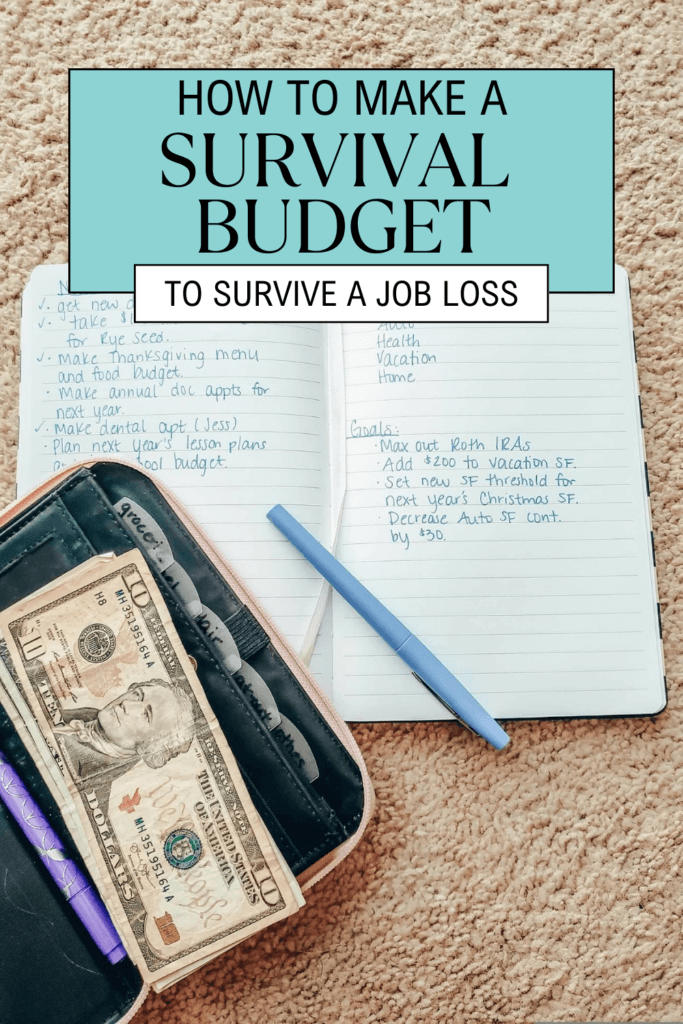
Job loss is real and painful. I hope that you never have to go through it, but unfortunately, it’s a reality that many face. So how do we survive it? Pat and I survived job loss back in 2008 when the Great Recession happened, and even though there were a lot of things we did wrong, there are some things that we did right. We also learned a lot during that time. Let’s talk about making a Survival Budget of sorts.
What is a Survival Budget
I know folks don’t like to think about budgeting, but the reality is when you’re facing a potential layoff, all you end up thinking about is, “How am I going to afford XYZ.” Therefore, all you’re thinking about is your budget, even if you’ve actually budgeted a day in your life. A survival budget is a bare-bones budget. One that is meant to get you through hard and uncertain times. It’s not at all meant to be your norm. It’s your life preserver in storm weather lost at sea.
Here’s how to do it
If you suddenly find yourself without a job, here’s how to make your Survival Budget:
Step 1: Gather Information
Go back through your last 30 days of transactions (wherever you spend money – checking account, credit cards, etc.). Tally up how much you spent last month and break those transactions out into categories. Next, you need to write out an actual inventory of all the food you have in your pantry, freezer, and refrigerator. Make sure you include the quantities. This is a great time to clean out these spaces of old and expired food as well. This inventory is going to help you meal plan around what you already have in place.
Step 2: Where can you reduce and eliminate?
Looking at your last 30 days’ worth of transactions, where can you reduce your expenses and eliminate them? Remember you’re in survival mode – so there’s a lot here we can probably eliminate even if it makes you uncomfortable. This isn’t permanent. It’s temporary. We’ve got to stretch the money you do have so we have to be ruthless in eliminating as many expenses as possible. So here we go:
- Cut all entertainment costs, including streaming services and cable/satellite. Hook up that old DVD player and watch those old movies you’ve still got collecting dust.
- Consider cutting the internet. Obviously, this one is tougher to do when you’re job searching, but if you’re really strapped for cash, head to your local library to use their internet for job searching.
- Cut out all snacky foods. They literally eat away at your grocery budget. As a mom of three, I know this is tough to do, but it’s important. Again, we’re stretching what we’ve got and making it last. We need to focus on the biggest bang for our buck when it comes to grocery shopping. And many snacky foods can be made at home using ingredients you probably already have on hand.
- Reduce all debt payments to their minimum payments. If you were killing off debt, it’s time to hit the pause button. This is temporary, and I know that it feels like a step backward, but trust me – you’ve got to stretch what you’ve got in order to avoid going further into debt. So, for now, reduce all debt payments to their minimums. I also recommend calling up your creditors and letting them know that you’ve lost your job. Many are willing to help you out by either reducing the minimum payment due or giving you a month or two grace period where you don’t have to pay. It doesn’t hurt to make a phone call.
- Cut all personal spending to nothing. Again, I know this is tough. Self-care is a big deal, and having to cut it out of the budget is so hard. But once again, it’s a temporary sacrifice until you’ve secured another job.
Step 3: Generate additional cash.
This step may require some creativity on your part, but it’s important that while you’re job hunting, you’re also hunting for ways to bring in some extra cash. Some of these ideas will be pretty easy and simple. Other’s will be a little more sacrificial but remember it’s all temporary.
- Use the app Upside every time you fill up your car to earn cash back on fuel purchases.
- Use the app/website Rakuten to get cashback on any online purchases, including many grocery pickup and delivery orders.
- If your car has a massive car payment attached to it, consider selling your car and paying off the loan to stretch your cash. Even if your car is paid for, you may still want to consider selling it if you have public transportation available to you.
- Pick up a side hustle: Door Dashing, Ubering, Instacarting, or doing others’ laundry through either a service like Sudshare or on your own.
- Look into doing surveys and mystery shopping through Field Agent (sometimes they don’t pay you in cash but give you money to spend on product – which is amazing when it’s at a grocery store as that can help to stretch your grocery budget!).
Step 4: Ask for help
Please don’t be afraid to ask for help. There’s no reason to feel shame when you’ve lost your job. Please reach out for help when you need it. Search for local food pantries in your area and stock up on food for your family to stretch your cash. Contact your church and let them know that you’ve fallen on hard times and need help. You’ll be surprised how many are willing to help you find a job, make you a meal, donate clothing, etc. Sometimes, all you have to do is ask and be willing to accept help.
The Best Way to Avoid Job Loss
You can’t. You can’t truly avoid job loss as there are a lot of factors outside your control. But what you can do is to prepare long before an event like this happens. This is why I always recommend to my coaching clients that before they start aggressively paying down debt, they first start a Starter Emergency Fund. In my opinion, a Starter Emergency Fund should be at least one month’s worth of living expenses saved, which for most people will be around $3,000-$5,000. Even though this may not seem like a lot of money to have saved, it’s so important! That one month’s worth can help you float through a job loss and stretch out your cash with your Survival Budget.
Yes, of course, a more robust Emergency Fund that’s three or six months would be better. But having anything saved is better than nothing at all. So please if you don’t already have at least one month’s worth of living expenses saved up and you’re still currently employed, you need to work on that today. Don’t wait for a catastrophe to happen before you take saving money seriously.
OTHER POSTS YOU MAY ENJOY






Leave a Reply